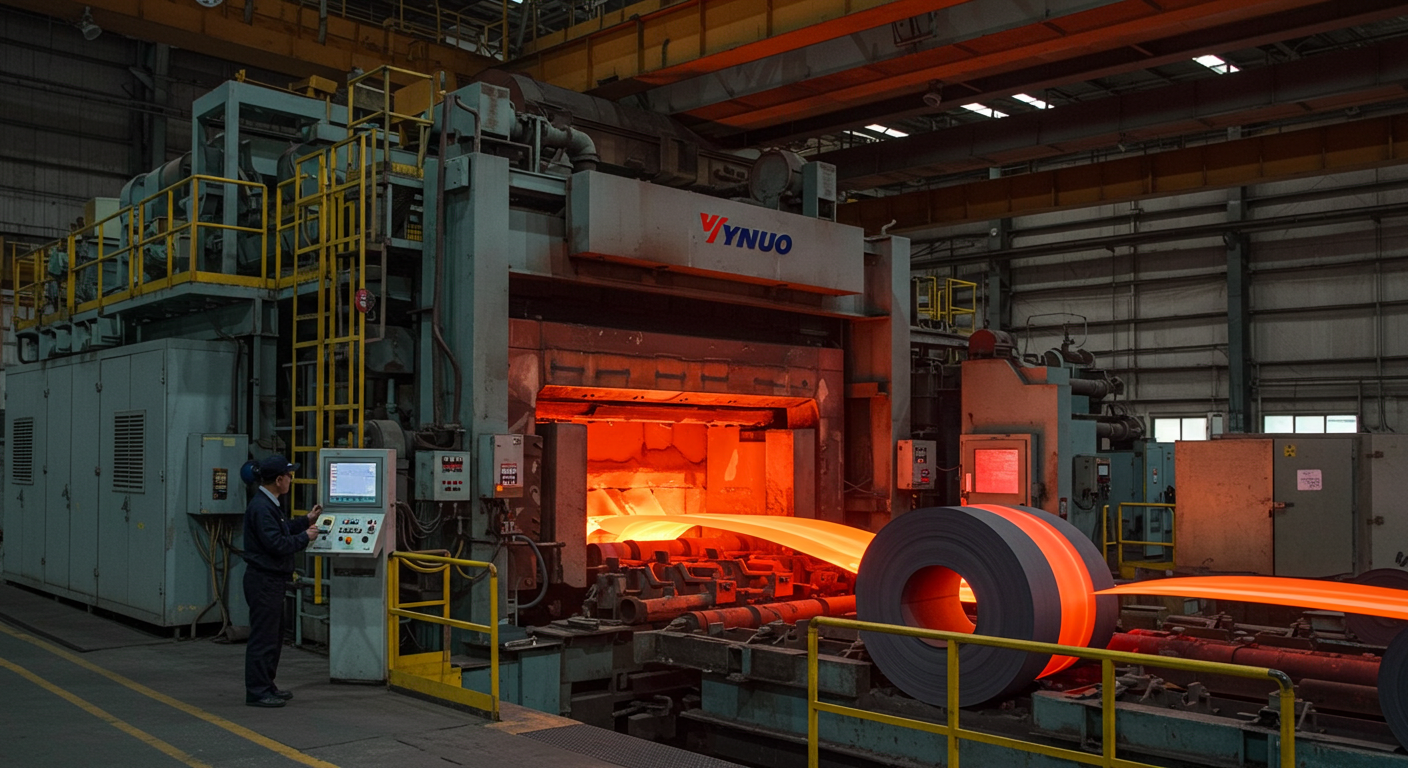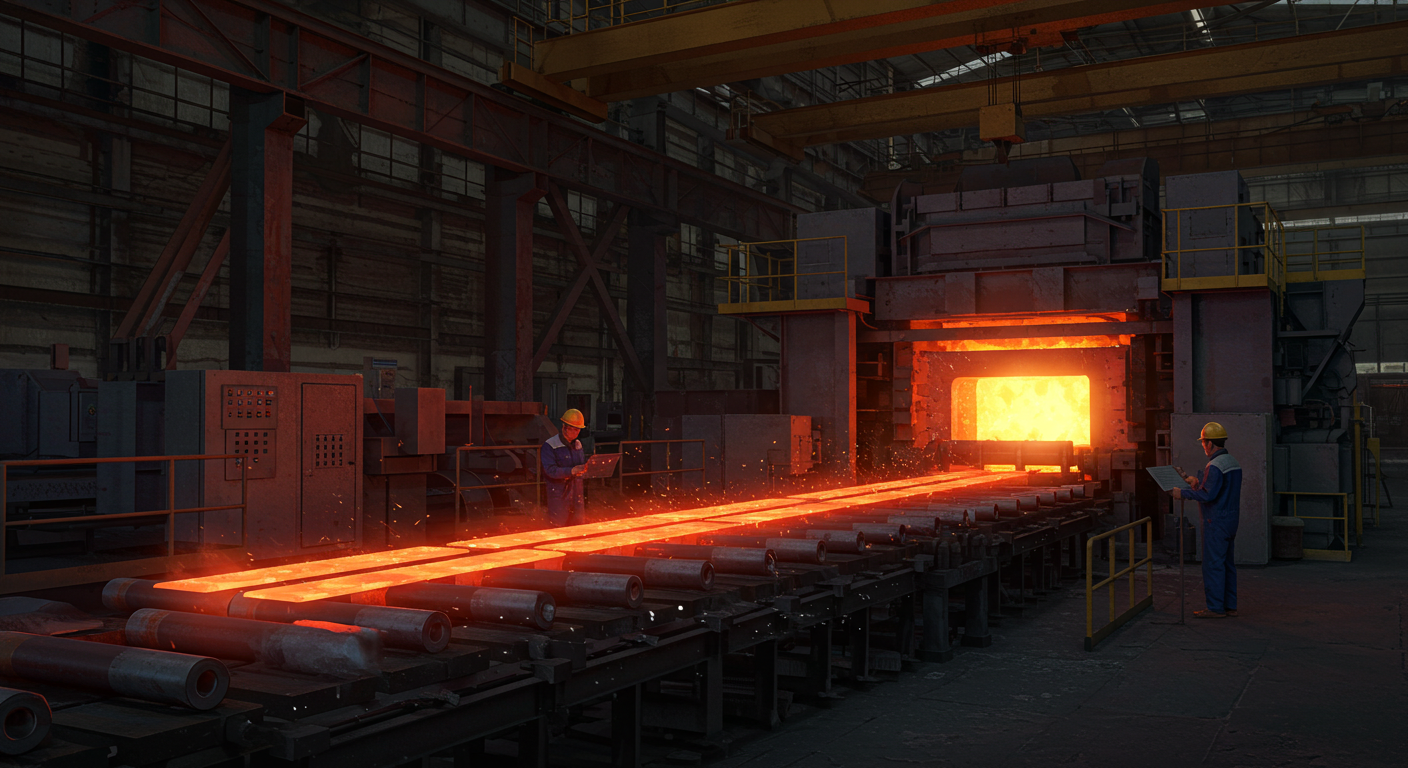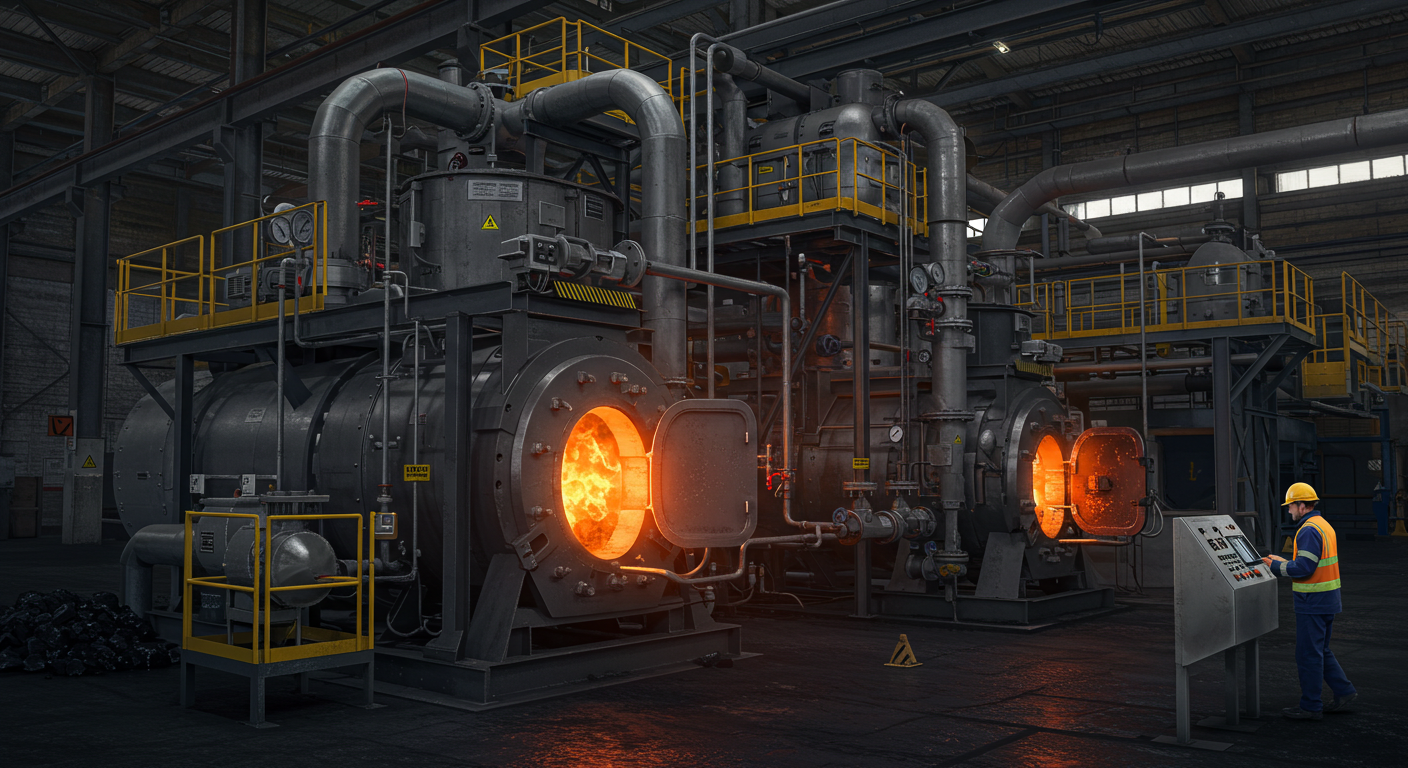
Metal heat treating furnaces are the cornerstone of modern metallurgy, enabling manufacturers to transform raw metals into high-performance components with tailored properties like hardness, strength, and ductility. These furnaces are critical for industries such as aerospace, automotive, and tool manufacturing, where precision and reliability are paramount. Jiangsu Yinuo Thermal Energy Technology Co., Ltd., based in Xuzhou, China, leads the industry with advanced heat treating furnace solutions. This guide explores the technology, processes, and applications of metal heat treating furnaces, showcasing why Jiangsu Yinuo’s expertise is trusted globally.
The Science of Metal Heat Treatment
Metal heat treatment involves precise heating and cooling cycles to modify the microstructure and properties of metals. By controlling temperature, time, and cooling rates, manufacturers can achieve specific characteristics, such as increased wear resistance or improved machinability. This process is essential for producing components that meet stringent performance requirements, ensuring durability and functionality in demanding applications. Heat treating furnaces provide the controlled environment needed to execute these complex thermal processes with accuracy, making them indispensable in metalworking.
Core Objectives of Heat Treatment
The primary aim of heat treatment is to optimize metal properties for specific uses. Hardening increases a metal’s resistance to deformation, ideal for cutting tools, while annealing softens metals for easier forming or machining. Tempering reduces brittleness in hardened metals, enhancing toughness for automotive parts. Stress relieving eliminates internal tensions from prior processes, preventing cracks in critical components. These objectives allow manufacturers to produce metals that perform reliably, from turbine blades to structural steel.
Commonly Treated Metals
Heat treatment furnaces process a variety of metals to meet diverse industrial needs. Steel, including carbon and stainless varieties, is frequently treated for applications requiring strength or corrosion resistance. Aluminum alloys, valued for their lightweight properties, are heat-treated for aerospace and automotive components. Titanium alloys, known for high strength-to-weight ratios, undergo treatment for critical parts like aircraft frames. Copper alloys are processed to enhance conductivity for electrical systems, demonstrating the versatility of heat treatment in metallurgy.
The Role of Metal Heat Treating Furnaces
Metal heat treating furnaces are specialized systems designed to deliver precise temperature control, uniform heating, and controlled atmospheres for metal processing. These furnaces ensure metals undergo the exact thermal cycles needed to achieve desired properties, operating at temperatures up to 1300°C or higher. Their ability to maintain consistency and protect materials from contamination makes them essential for producing high-quality components in industries where precision is non-negotiable.
Essential Components
A metal heat treating furnace is a sophisticated assembly of components. The heating chamber, lined with refractory materials, withstands extreme temperatures while minimizing heat loss. Advanced temperature control systems, often using PID controllers, maintain precise thermal profiles for consistent results. Atmosphere management systems regulate gases like nitrogen or argon to prevent oxidation or decarburization during processing. Material handling mechanisms, such as trays, rollers, or conveyors, enable efficient loading and unloading, supporting both batch and continuous operations.
Types of Heat Treating Furnaces
Heat treating furnaces come in various configurations to suit different processes. Batch furnaces offer flexibility for small to medium runs, ideal for custom or specialty components. Continuous furnaces, equipped with automated conveyor systems, are designed for high-volume production, common in automotive manufacturing. Vacuum furnaces provide oxygen-free environments for sensitive alloys like titanium, ensuring purity. Pit furnaces, built into the floor, accommodate long components like shafts. Bell furnaces, with removable covers, supply protective atmospheres for precise treatments, catering to diverse industrial needs.
Applications Across Industries
Metal heat treating furnaces are vital to multiple sectors, enabling the production of components that meet rigorous performance and quality standards. Their precision and versatility make them indispensable for creating materials that drive technological and industrial progress.
Steel and Tool Manufacturing
In steel and tool manufacturing, heat treating furnaces harden and temper components like cutting tools, dies, and structural steel. Hardening enhances wear resistance, while tempering ensures toughness, critical for tools that endure heavy use. Annealing softens steel for machining, facilitating the production of complex parts. These processes ensure tools and steel components perform reliably in construction, manufacturing, and heavy machinery, reducing downtime and maintenance costs.
Aerospace and Defense
Aerospace relies on heat treating furnaces to process alloys like titanium and aluminum, used in aircraft frames, engines, and landing gear. Vacuum heat treatment ensures these materials achieve high strength without contamination, meeting stringent safety standards. Superalloys, common in turbine blades, undergo complex thermal cycles to withstand extreme temperatures. The precision of these furnaces is crucial for producing components that ensure aircraft reliability and performance under demanding conditions.
Automotive Sector
Automotive manufacturers use heat treating furnaces to enhance the durability of engine components, gears, and suspension parts. Hardening and carburizing increase surface toughness, while tempering balances strength and flexibility. These processes ensure vehicles are safe and reliable, even in harsh environments. Continuous furnaces are widely used in this sector, supporting high-volume production of standardized parts with consistent quality, essential for meeting automotive industry demands.
Energy and Electronics
In the energy sector, heat treating furnaces process components for turbines, pipelines, and renewable energy systems, ensuring durability under high stress. In electronics, furnaces anneal copper alloys and semiconductor substrates to improve conductivity and performance. These applications require precise thermal control to achieve specific material properties, enabling innovation in power generation and technology. Heat treating furnaces play a key role in producing reliable components for these critical industries.
Jiangsu Yinuo’s Heat Treating Furnace Expertise
Jiangsu Yinuo Thermal Energy Technology Co., Ltd., located in Jiangsu Province’s high-tech industrial zone, is a premier manufacturer of metal heat treating furnaces. With a 70,000-square-meter facility, over 400 professionals, and 13 years of global experience, the company delivers innovative solutions tailored to diverse industrial needs.
Why Jiangsu Yinuo Excels
Jiangsu Yinuo’s dedication to innovation is evident in their multiple patents, which drive advancements in furnace technology. They offer comprehensive services, including custom design, installation, and after-sales support, ensuring seamless project execution. Their extensive export experience enables them to serve clients worldwide, adapting to varied industrial requirements. Rigorous quality control, overseen by skilled engineers, ensures compliance with international standards like ISO and CE. Their customer-centric approach delivers bespoke solutions that align with specific operational goals.
Features of Jiangsu Yinuo’s Furnaces
Jiangsu Yinuo’s heat treating furnaces are engineered for precision, efficiency, and durability. Advanced temperature control systems maintain temperatures from 200°C to 1300°C, ensuring uniform heating for consistent results. Energy-efficient designs incorporate high-quality insulation and regenerative systems, minimizing fuel or electricity use. Robust construction, using premium refractory materials, ensures longevity and low maintenance. These furnaces support processes like annealing, hardening, and tempering, and are adaptable for batch or continuous production. Protective atmosphere systems prevent material degradation, delivering high-quality components.
Customization for Specific Needs
Jiangsu Yinuo specializes in tailored furnace solutions. They consult with clients to understand material and process requirements, designing furnaces that meet precise specifications. Manufacturing occurs in their state-of-the-art facility, using advanced equipment for accuracy. On-site installation and commissioning ensure seamless integration, while ongoing maintenance and technical support maximize performance. This customized approach ensures furnaces align perfectly with client operations, from small-scale precision to high-volume production.
The Heat Treatment Process
Heat treatment is a multi-stage process that requires precise control within the furnace to achieve desired metal properties. Each stage is critical to ensuring the final component meets its intended specifications.
Heating Stage
During the heating stage, metals are brought to a specific temperature based on their composition and desired properties. For instance, steel may be heated to 800–1000°C for hardening, while aluminum requires lower temperatures for annealing. Uniform heating prevents thermal gradients that could cause distortions or cracks. Heat treating furnaces use advanced controls to maintain consistent temperatures across the chamber, ensuring even processing and reliable outcomes.
Holding Stage
In the holding stage, metals are maintained at the target temperature to allow microstructural changes to occur. This stage facilitates processes like grain refinement, stress relief, or phase transformation, depending on the treatment. Atmosphere control is essential to prevent oxidation or surface defects, particularly for alloys like titanium. Jiangsu Yinuo’s furnaces offer precise atmosphere management, using inert gases to protect metals during this critical phase, ensuring high-quality results.
Cooling Stage
The cooling stage determines the final properties of the metal. Rapid quenching in oil or water hardens steel by creating a rigid structure, while slow cooling, such as furnace cooling, softens metals for annealing. Controlled cooling rates prevent new stresses or defects, ensuring material integrity. Heat treating furnaces are equipped with cooling systems that deliver consistent and repeatable results, tailored to the metal’s specific requirements.
Energy Efficiency and Sustainability
Energy efficiency is a critical consideration in modern manufacturing, driven by cost pressures and environmental regulations. Jiangsu Yinuo’s heat treating furnaces are designed to minimize energy consumption while delivering high performance.
Energy-Saving Technologies
High-quality insulation materials reduce heat loss, enabling furnaces to maintain stable temperatures with less energy. Efficient heating systems, whether electric or gas-fired, optimize energy conversion, lowering fuel or electricity use. Regenerative systems in some models recycle heat, further reducing costs. Programmable controls ensure precise temperature management, avoiding energy waste during idle periods, making these furnaces both economical and environmentally responsible.
Environmental Benefits
Electric and hybrid furnaces produce fewer emissions than traditional gas-fired models, aligning with global sustainability goals. Controlled atmospheres minimize harmful byproducts like oxides, reducing environmental impact. Durable furnace designs extend service life, decreasing the need for resource-intensive replacements. These features help manufacturers comply with regulations and reduce their carbon footprint, supporting a greener industrial future.
Cost Savings
Energy-efficient furnaces lower utility bills, providing significant savings over time. Precise processing reduces material waste and rework, improving overall efficiency. Reliable furnaces minimize downtime and maintenance costs, ensuring consistent production. By combining sustainability with economic benefits, Jiangsu Yinuo’s furnaces offer a compelling solution for cost-conscious manufacturers.
Quality Assurance and Support
Jiangsu Yinuo’s commitment to quality ensures every heat treating furnace meets the highest standards of performance and reliability.
Rigorous Quality Control
Engineers oversee every stage of production, from design to final testing, ensuring precision and durability. Premium refractory materials and components are selected for their ability to withstand extreme conditions. Each furnace undergoes rigorous testing to verify temperature accuracy, atmosphere control, and operational reliability, guaranteeing consistent performance in demanding applications.
Compliance and Documentation
Jiangsu Yinuo’s furnaces comply with international standards, including ISO 9001 and CE certifications, ensuring global acceptability. They provide comprehensive documentation, such as Certificates of Analysis and compliance reports, to meet industry requirements. This is critical for sectors like aerospace and automotive, where traceability and quality assurance are essential for regulatory compliance.
Exceptional Customer Support
The company offers prompt issue resolution, ensuring minimal disruption to operations. Detailed manuals and operator training facilitate seamless furnace use. Clients can access support via email, phone, or the official website, with a responsive team ready to assist. This dedication to service strengthens Jiangsu Yinuo’s reputation as a trusted partner.
The Future of Heat Treating Furnaces
The heat treating furnace industry is evolving, driven by technological advancements and sustainability demands. Jiangsu Yinuo is at the forefront, shaping the future with innovative solutions.
Emerging Trends
Automation is transforming furnaces, with IoT and PLCs enabling real-time monitoring and process optimization. Smart furnaces use data analytics to refine thermal cycles and predict maintenance needs, reducing downtime. Sustainability is a key focus, with electric furnaces gaining traction to reduce emissions. Customization is also rising, with demand for furnaces tailored to new materials like advanced alloys or additive-manufactured metals.
Jiangsu Yinuo’s Vision
Jiangsu Yinuo invests in research and development to pioneer new furnace technologies. They are expanding their global presence, targeting emerging markets in Asia, Africa, and Latin America. By collaborating with clients, they develop solutions for cutting-edge applications, ensuring their furnaces remain industry leaders. This forward-thinking approach positions them as a reliable partner for future challenges.
Choosing the Right Heat Treating Furnace
Selecting the ideal furnace requires careful evaluation to ensure it aligns with production and operational needs.
Key Factors to Consider
Material compatibility is essential, ensuring the furnace supports specific metals like steel or titanium. The intended process—whether hardening, annealing, or tempering—determines the furnace type and temperature range. Production scale influences the choice between batch furnaces for flexibility or continuous furnaces for high volume. Atmosphere requirements, such as vacuum or inert gas, are critical for sensitive alloys. Energy efficiency features, like insulation and regenerative systems, impact long-term costs and sustainability.
Partnering with Jiangsu Yinuo
Jiangsu Yinuo’s team provides expert guidance, working closely with clients to understand their requirements. They design custom furnaces tailored to specific processes and production goals. With professional installation and ongoing support, they ensure furnaces perform optimally, delivering value and reliability. Their official website offers a gateway to explore options and connect for tailored solutions.
Frequently Asked Questions
What is the purpose of a metal heat treating furnace?
Metal heat treating furnaces heat and cool metals to enhance properties like hardness, strength, or ductility, producing reliable components for industrial applications.
What metals can Jiangsu Yinuo’s furnaces process?
Their furnaces process steel, aluminum, titanium, copper alloys, and other metals, supporting diverse needs in industries like aerospace and automotive.
How does Jiangsu Yinuo ensure furnace quality?
Engineers oversee production with rigorous testing and premium materials, providing compliance documentation to meet international standards like ISO and CE.
Are Jiangsu Yinuo’s furnaces customizable?
Yes, they design tailored furnaces to meet client-specific requirements, offering support from design to installation for optimal performance.
How energy-efficient are Jiangsu Yinuo’s furnaces?
Their furnaces feature advanced insulation, efficient heating, and regenerative systems to minimize energy use, reducing costs and environmental impact.
How can I request a quote from Jiangsu Yinuo?
Visit their official website to submit a contact form, or reach out via email or phone for a prompt response.
Conclusion: Elevate Your Metallurgy with Jiangsu Yinuo
Metal heat treating furnaces are essential for producing high-performance components that power modern industries. Jiangsu Yinuo Thermal Energy Technology Co., Ltd. delivers innovative, efficient, and customized furnace solutions that empower manufacturers worldwide. With a focus on precision, sustainability, and client satisfaction, they are the ideal partner for achieving metallurgical excellence. Explore their offerings on their official website and connect for a personalized quote to transform your production today.







